- Home
- Jonathan Stroud
The Outlaws Scarlett and Browne Page 2
The Outlaws Scarlett and Browne Read online
Page 2
He could do it, though. Get the gun. He used to shoot birds out on the flats, blast them down when the beaters blew the horns. Did it almost before they took to the air. He was older now, but he wasn’t so slow. He could do it. The question was when. He realized that his hands were shaking.
Maybe it was better to keep her talking.
“You’re clearly rather an unhappy person, my dear,” he said. “You need guidance. If you want, we could pop along to the Faith House, get a Mentor to set you right.”
“Oh, I don’t think so,” the girl said. “Thirty-five seconds.”
Mr. Appleby glanced at Old Reliable. The hoary time-blackened face of the clock showed 12:27. Miss Petersen never stayed out long. Yes, his staff would come back soon, find Eric, see something was wrong…“You’re not from here, I take it,” he said. “Maybe you didn’t see the cages in the square? Just opposite the tea shop?”
“Thirty seconds remaining,” the girl said. “Yeah, I saw them.”
“Those cages are where we put petty criminals here in Cheltenham,” Mr. Appleby said. “You quit this nonsense now, you’ll get away with a day or two in the cage. Nothing too painful—just a bit of public jeering, maybe some prodding with the poles of justice. Then you’re run out of town. But if you don’t quit it…” He tried to speak slowly, put emphasis on every word. “If you don’t quit, we’ve got the iron posts at the far end of the fields. We tether you there and leave you for the beasts. Or, who knows, maybe the Tainted will come out of the woods and carry you off alive. Do you want that, my dear? I’m an Appleby, one of the ruling families in this town. I can arrange it, easy as blinking. Thieves, deviants, bank robbers: that’s what we do to them.”
“Yeah?” The girl’s green eyes gazed at him, unblinking. “Seems you’re pretty tough. But I do things too. Ask the big guy in the lobby downstairs. Ask four dead outlaws out there in the fens.” She blew a tiny bubble of pink gum, let it pop back into her mouth, continued chewing. “One thing I won’t do,” she added, “is waste time with my life on the line. Your speech there took fourteen seconds. I’ve used up another six. That’s ten left to get that safe open, to remember the combination and turn the wheel just right. And you with those poor old shaky hands and all.”
Mr. Appleby swallowed. “I’m not opening the safe,” he said.
“Eight seconds.”
Just a quick movement would be all he needed. Distract her, wrench the drawer, pull out the gun…“I really think,” he said, “we should talk about this.” Gabbling now. Calm down. She wasn’t going to do anything.
“Six.”
He looked toward the window.
“Five,” the girl said. “Four.”
“You’re too late.” Mr. Appleby pointed down into the street. “The militia are here.”
The girl rolled her eyes, but she turned her head to look, and Mr. Appleby yanked at the gun drawer. Stiff, yes—but he had it open! Damn it, the gun was wrapped in a handkerchief! Why had he done that? What was he thinking? Who wrapped their revolver like a birthday present? He flicked off the cloth, had it in his hand. He jerked his arm up, cocked the gun—
—and found the girl had a revolver of her own already pointed at his heart. She looked infinitely bored. Another bubble emerged, slowly, insolently, from the center of her mouth. She moved a strand of hair away from her face.
Bang! The bubble popped. With a groan of fear, Mr. Appleby flinched backward in his chair. He dropped the gun with a thump upon the desk.
“Three, two, one,” the girl said. “Time’s up, Horace. Now open the bloody safe.”
“All right!” Mr. Appleby rose; in a flurry of frantic movements, he turned the circular dial, using his grandfather’s code, and swung the safe door open. He heaved the strongbox out and dumped it down between the revolver and the plate of biscuits.
“There,” the girl said. “That wasn’t so hard, was it?” She gestured with the gun. “Now take off the lid.”
He did so. Inside, as lovingly prepared by Mr. Appleby himself, was the bank’s cash reserve: neatly wrapped wads of fifty-pound notes, Wessex issue, stacked, spotless, and vulnerable. It made Mr. Appleby sick at heart to see them like that, so naked and exposed. He stared at them miserably.
The girl took a string bag from somewhere, shook it out. “Put the notes in, please.” She glanced toward the door.
A great hatred rose in Mr. Appleby as he obeyed her. It was hatred for the chaos that ruled beyond the walls of the Surviving Towns, out there in the endless fens and forests; chaos that had the impudence to skip into his study wearing dirty boots and a leather coat.
“I’ll see you killed,” he said. “Where are you going to run to? Mercia? The Wilds? We’ve got trackers.”
“Yeah. But they’re no good.” She was doing up the bag, looking at her watch.
“I have friends in every town.”
“Friends? With your personality? That I seriously doubt.”
“You are stealing Faith House money. You understand that they have operatives? They’ll hunt you down.”
The girl hefted the bag in her hand. “Will they? You heard of Jane Oakley, Mr. Appleby?”
“No.”
“Jenny Blackwood?”
He shook his head.
The grin became a glare. “Geez. Don’t you ever read the newssheets?”
“I assume they’re outlaws and brigands. Wicked females who beset the towns.” He leaned toward her across the desk, quivering with all the righteous fury of a rich, respectable man. “They’re your associates, I suppose?”
“No.” The girl bent in close. He caught the smell of woods and water, and of a none-too-fragrant woolen sweater. “They’re not my associates, Mr. Appleby. They’re me.”
There was a soft cry from the doorway. Mr. Appleby and the girl looked up. Miss Petersen stood there, openmouthed and anguished, and with her—thank Shiva!—a militiaman in his dark green bowler hat.
For an instant, no one moved.
To his own surprise, Mr. Appleby reacted first. He snatched at the string bag, yanking it toward him. The girl came with it; he struck out wildly at her, but she ducked beneath the blow, swiveled, and punched upward with a strong, thin arm. Pain exploded in Mr. Appleby’s midriff, in the region of his tea and sandwiches. He let go of the bag and toppled backward in his chair. Moaning, flailing, through his streaming tears, he saw the militiaman begin to move. But where was the girl? Above him, on the desk! She’d jumped so fast, he’d barely seen it. She caught his eye, smiled. Bending low, she clutched the bag of notes to her, then sprang straight over Mr. Appleby and out through the plate-glass window, pulling it away with her in a cone of sparkling shards.
Gone.
Blue sky. Sunlight. A heartbeat of silence.
A sudden outcry from below.
Dead, surely! Clutching at his stomach, Mr. Appleby hoisted himself up. He took a stumbling step, leaned out of the window, gazed down upon a wonderland of spreading glass and scattering pedestrians.
Where was the body? He rubbed his eyes.
Somewhere near, a bell gave a merry tinkle. Mr. Appleby looked up the road.
There—a bicycle! The girl on it, pedaling like a demon, the string bag bouncing at her shoulder. She looked back once, saw him peering, made an abusive sign. Then she swerved round a toddler, upended an old lady into the gutter, and sped on.
Mr. Appleby could hear Miss Petersen behind him, yabbling like a crow. He heard the militiaman blowing his whistle, blundering his way downstairs. He ignored these distractions, craned his head out of his broken window, and watched his money receding up the street. Soon he could no longer see the bag, only a dancing flash of bright red hair, which seemed to wave cheerily at him as it passed the post office and the duck pond and the bus stop, and so vanished at last through the gates of Cheltenham and out into the Wilds.
Even so, the Cheltenham pursuit proved more capable than Scarlett McCain had expected.
She sat under cover at the edge of the trees, looking through her binoculars at activity on the marsh road. The search teams were fanning out now. Trackers with rifles; members of the militia in their green bowler hats; guys with big black dogs scurrying around. How those dogs could follow the scent of a bicycle Scarlett didn’t know, but they were doing a decent job of it. Everyone moved swiftly, efficiently, with a grim and purposeful air. The Cheltenham Cooperative was their bank, and she had their money in her bag. They’d definitely risk the woods a little way before it got dark.
Scarlett wrinkled her nose. That was the drawback of doing a job at lunchtime. The chase would last a bit longer than usual.
But it was OK. The bike was underwater in a ditch. The cash was in her rucksack, and her rucksack was once more on her back. She had everything she needed, nothing to slow her down. Tucking the binoculars away, and keeping her head low, she retreated through the bracken and into the shadow of the trees.
To begin with, the woodlands were sporadic and half tamed. She passed loggers’ camps, rough fields for pasture, grassy apple orchards, rows of beehives. Armed guardsmen watched over the pigs rootling in the orchards, while shepherds walked close beside the sheep flocks, keeping an eye on the thickets beyond. Scarlett slipped by them all, unseen, and so came to a remote and sunlit meadow, where the town’s punishment posts stood on an ancient concrete platform. The chains hung empty. Light pierced the clouds; the trees around were soft and golden. There was an atmosphere of somber melancholy in the glade. Scarlett felt a twinge in her belly, a deep, remembered pain that she did not want to acknowledge. From far away came the yammering of dogs. She plunged on into the deeper Wilds and left the Cheltenham paths behind.
She went at a brisk pace, boots scuffing through the sandy soil, past shadowy boles and fallen branches, without bothering to disguise her trail. From time to time she checked the compass on her belt chain, keeping north by east, in the general direction of the Mercian border town of Stow. If she kept away from the roads, she would reach Stow’s safe-lands early the following afternoon. It meant a night out under the trees, but that didn’t trouble Scarlett. She had done many such journeys, and nothing had killed her yet.
An hour into the forest she came to a dead zone, where black mold rimed the trunks and a sour smell of ash persisted in the air. Here she saw crude symbols on the rocks, animal skulls wedged in crevices, dark blue slashes daubed on branches. The marks were old and faint, but it was a place to tread cautiously. Scarlett listened, and heard the noises of animals in the undergrowth and birds calling overhead. Her movements became easier. If the wildlife was relaxed, the Tainted were unlikely to be near.
Another hour, and with the trees once again verdant and the air clean, her pace had slowed. She began to think of Stow’s attractions: its pubs, gaming tables, and hot food. When she got there, she would first pay off her debt to the Brothers of the Hand, then start enjoying herself. In the meantime, she was on her own in the wilderness, which was just how Scarlett McCain liked it. She could not hear the dogs. The search parties were surely far behind. Provided she kept clear of wolves and other dangers, she had little to worry about.
It was then that she found the bus.
* * *
—
Coming out of a fern-choked gully, she saw ahead of her the curved embankment of a Tarmacked road cutting its way through the forest. It was probably the one linking Cheltenham with Evesham to the north. The slope rose steeply, almost as high as the canopy of the trees, but Scarlett’s eyes were fixed on its foot, where an upturned bus lay, wrecked and broken, its battered side pointing at the sky.
She could see where it had pitched off the highway at the curve of the road, splintering the posts of the barrier fence, before turning over onto its roof and sliding most of the way down. A great black smear had been gouged through the vegetation, with many stones pulled loose by the fury of the descent. Near the bottom of the hill, the bus had struck rocks and tipped again, coming to rest on its side across the middle of a little stream. The undercarriage faced her, black, shining, indecently exposed. The wheels were still; there was silence in the forest valley. A thin trail of oil danced and twisted in the water passing out from under the bus, shimmering away beneath the sun. A company of flies moved in the air on either side of the metal carcass, like black lace curtains quivering in a breeze. But there was no wind, and other than the flies no sign of life. Even so, Scarlett McCain did not stir from her position in the shadow of the ferns, but remained still, watching the rise and fall of the flies.
Something swift and blue flashed above the water. A kingfisher looped along the stream and veered away into the trees. Scarlett came out of the brake. She walked to where the bus lay like a stricken beast: a vast thing, stupid in its haplessness.
A great hole had been torn in the side of the bus that faced the sky. The metal around the hole was peeled up and outward like the petals of an iron flower.
There was a smell of petrol and spilled blood.
Scarlett halted with her boot caps resting in the oily water and listened again. Just the insects’ buzzing, the indifferent trickle of the stream. Fragments of gory clothing were strewn across the stones on either bank, where the soft ground had been churned by giant paws. She could see the prints in the mud and bloody drag marks glittering beneath quivering coatings of flies. The marks curved away from the embankment and into the trees.
It had been a Wessex Countryman, one of the bus services that linked the fortified towns. The blood on the ground was no longer fresh. The crash had happened at least the day before. Possibly some survivors had got out before the beasts emerged from the woods; but they had certainly not all escaped.
In any event, they were gone now, leaving their possessions behind.
Scarlett put her hand under her hair and scratched the back of her neck. Then she assessed the position of the sun. The creatures that had scoured the bus were unlikely to return before dark. It was still only midafternoon.
She vaulted up onto the exposed side of the bus and walked along it toward the great torn hole. Through the windows under her feet she could see broken seats, cases, scattered clothes—a spoil heap of bloody debris. Some of the eating had been done inside the bus. Bears or wolves, maybe, obeying the urgency of their hunger. Only when they were full would they have hauled the remaining bodies away.
When she reached the crater, Scarlett paused again for a time, pondering the implications of the outward curl of metal, the way the hole had been punched from within…. But nothing stirred inside the bus, so she lowered herself carefully over the edge, swung like a pendulum for a moment, then dropped into the space beneath.
She landed lightly, knees flexing, coat billowing stiffly about her. Soft yellow daylight, thick with dust and death, streamed down from the line of windows above. Everything in the bus was turned ninety degrees out of true. Double rows of seats projected toward her from the side, forming deep recesses like the cells of a monstrous hive. One set of seats was low; the other hung above her head. Everything was strewn with a chaos of shoes, clothes, and pieces of light baggage that had been thrown around the tumbling bus and later torn by claws.
Scarlett saw little of immediate interest, but after ten minutes’ careful inspection she had forced open several bags and collected certain useful items: three tins of meat, one of chocolate pudding; a torch with a windup battery; and two books, much battered and repaired. Scarlett coul
d read and knew the value of books. They would fetch a good price at the Mercian fairs.
There was also a little metal briefcase, secured with a padlock that Scarlett could not break. She didn’t bother searching for the key. It had probably been in someone’s pocket, which meant it was now in the belly of a wolf. But the case was just heavy enough to be interesting, and she took that too.
She returned to her starting point beneath the hole, packed her prizes in her rucksack, and hung the briefcase securely beside the prayer tube. She was just gazing up at the sky and clouds, preparing to climb back out, when she heard the noise.
Freezing was easy; the hard part was rewinding her brain sufficiently to figure out what she’d actually heard. Not a single sound, she thought, but sounds—a thump, a scuffle, a whispered snatch of words. She looked back and for the first time noticed the large, boxlike construction projecting from the ceiling. It was an amenity that all buses had: the toilet cubicle. Its door was shut.
Everything was dead quiet. Scarlett looked up through the hole at the wandering clouds, at the freedom of the sky. She lifted her hands, arm muscles tensing, ready to launch herself out—
And sighed. With silent steps, she left the hole and approached the cubicle again.
When she got near the door, so that she was almost beneath it, she noticed a red bar showing beside the metal handle. There was a word on it: occupied.
There were also many long scratches scored deep into the varnished wood, showing where something had made frantic attempts to get inside.
Scarlett listened. No sound came from the cubicle.
She moved closer. The door was a few inches above her head. From the looks of the hinges, it would open downward.
She had an odd impulse to knock politely on the door, but resisted it as absurd. Instead, she cleared her throat; she had not spoken since leaving the bank, three hours before.

 The Leap
The Leap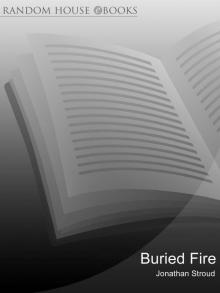 Buried Fire
Buried Fire Heroes of the Valley
Heroes of the Valley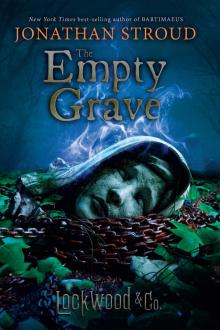 The Empty Grave
The Empty Grave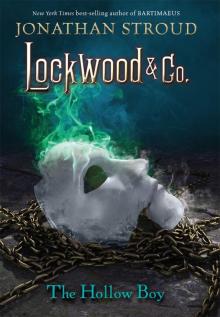 The Hollow Boy
The Hollow Boy The Last Siege
The Last Siege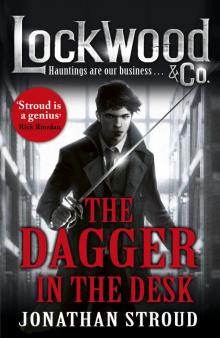 The Dagger in the Desk
The Dagger in the Desk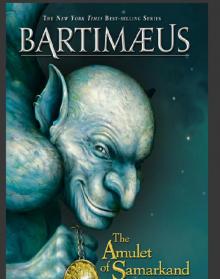 The Amulet of Samarkand
The Amulet of Samarkand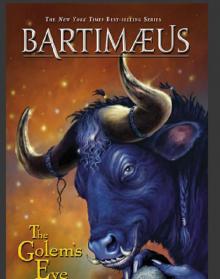 The Golem's Eye
The Golem's Eye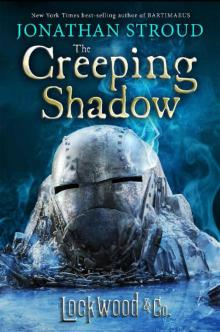 The Screaming Staircase
The Screaming Staircase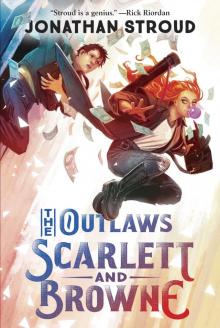 The Outlaws Scarlett and Browne
The Outlaws Scarlett and Browne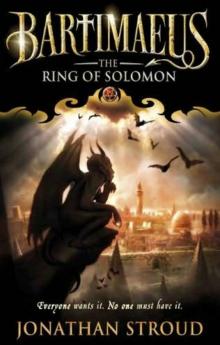 The Ring of Solomon: A Bartimaeus Novel
The Ring of Solomon: A Bartimaeus Novel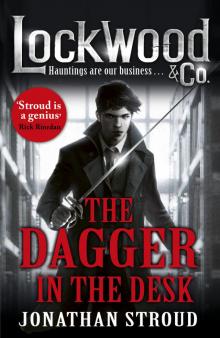 Lockwood & Co
Lockwood & Co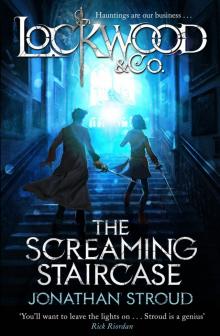 Lockwood & Co: The Screaming Staircase
Lockwood & Co: The Screaming Staircase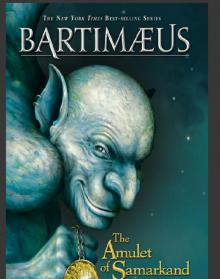 Bartimaeus: The Amulet of Samarkand
Bartimaeus: The Amulet of Samarkand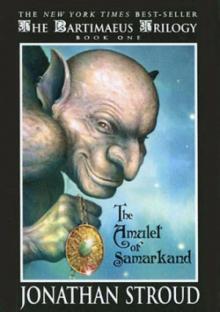 The Amulet of Samarkand tbt-1
The Amulet of Samarkand tbt-1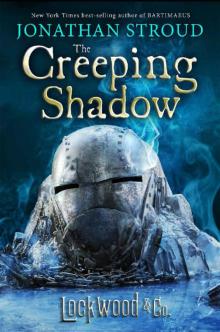 Lockwood & Co.: The Creeping Shadow
Lockwood & Co.: The Creeping Shadow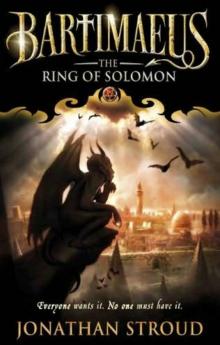 The Ring of Solomon
The Ring of Solomon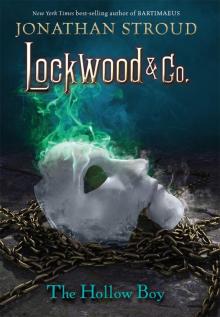 Lockwood & Co. Book Three: The Hollow Boy
Lockwood & Co. Book Three: The Hollow Boy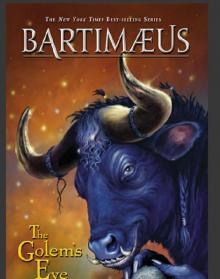 Bartimaeus: The Golem’s Eye
Bartimaeus: The Golem’s Eye